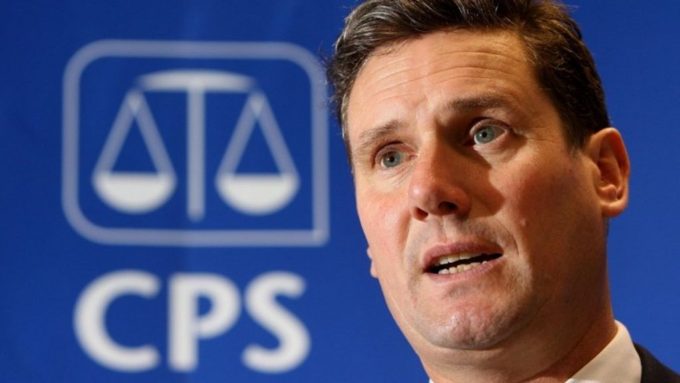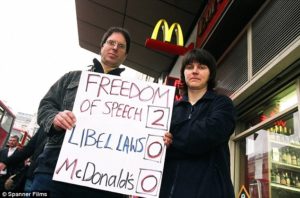
Keir Stamer as Director of Public Prosecutions
A group of climate activists are calling on Labour leader Keir Starmer to give evidence to the Undercover Policing Inquiry, alleging he may have been involved in a cover-up of police and prosecutors orchestrating wrongful convictions.
The 18 activists were part of a group of 114 arrested while planning a protest against Nottinghamshire’s Ratcliffe-on-Soar coal-fired power station in April 2009.
Some of them were prosecuted and convicted of conspiracy.
A further six were in a group prosecuted separately, whose trial dramatically collapsed after they discovered one of the protesters was undercover police officer Mark Kennedy.
When they asked to see Kennedy’s secret evidence, rather than disclose it the Crown Prosecution Service (CPS) dropped the charges. When the defendants were given transcripts of Kennedy’s secret recordings of the protest planning meetings, they did indeed exonerate the six. The 20 activists convicted at the earlier trial have now had their convictions quashed.
Two reports were commissioned into the withholding of evidence from the court, one by the Independent Police Complaints Commission, another commissioned by the then-head of the CPS, Director of Public Prosecutions Keir Starmer, who appointed Sir Christopher Rose to inquire.
The Rose report concluded that ‘the failures were individual, not systemic’. But when making a timeline of the facts as given in the two reports, it is clear that police and prosecutors knew full well about the involvement of undercover police, and went to great lengths to keep it secret.
The pivotal CPS figure was prosecutor Nick Paul, the CPS National Co-ordinator for Domestic Extremism (an extraordinary role, given that the term ‘domestic extremism’ has no meaning in law). Paul – who, due to Kennedy’s information, was aware of the Ratcliffe protest before it happened, indeed before many of the activists involved – and was already coordinating with police.
The Guardian published extracts of an email exchange between him and more junior CPS official, Nick Cunningham, discussing the risk of the truth coming out. The Rose report attributed the failings to Cunningham rather than Paul.
Nick Paul had previously been the CPS’ prosecutor in another case setting up climate activists with wrongful convictions, the Drax 29. This surely makes it a systemic issue. The Rose report includes a list of people interviewed; despite his central role in the case, Nick Paul is not mentioned.
By the time the Rose report was published in December 2011, we had learned that Jim Boyling another – wholly unrelated – undercover officer had similarly been involved in a court case in 1997 without the defence being given relevant evidence.
As DPP, Starmer handled the media on the Rose report personally, insisting that we must accept its finding that there’s no systemic problem, despite journalists pointing out to him that this was untrue.
Nick Paul left the CPS immediately after the Ratcliffe case collapsed, returning to be a barrister at Doughty Street Chambers, where he Starmer had previously been colleagues before they worked for the CPS. Starmer rejoined him after his tenure as DPP ended 18 months later.
The Undercover Research Group‘s report into the Ratcliffe case, Operation Aeroscope – A Re-examination, makes clear that there are still many serious questions unanswered.
The group of activists arrested at Ratcliffe-on Soar in 2009 are now asking for the relevant CPS officials to be called to give evidence to the Undercover Policing Inquiry.
The Inquiry’s terms of reference specify that it will examine such miscarriages of justice. It is already clear that, over decades, undercover officers from Britain’s political secret police were often arrested and went through the judicial system in their fake persona, lying to courts and withholding evidence. The problem was clearly systemic, and the public deserve answers.
Full text of the statement from the group of people arrested with Mark Kennedy at Ratcliffe-on-Soar:
Call Keir Starmer to give evidence to the Undercover Policing Inquiry
A decade ago this month the world learnt that Mark Kennedy was a Metropolitan Police officer spying on environmentalists. This information led to the collapse of a trial where six environmental campaigners were accused of conspiring to occupy a coal-fired power station. In the court building on the morning of January 10th 2010 as the trial collapsed was the then Director of Public Prosecutions (DPP) and head of the Crown Prosecution Service, Keir Starmer.
Subsequently, the convictions of 20 campaigners for conspiring to occupy the same coal-fired power station were quashed by the Court of Appeal, because the prosecution failed to disclose information about Mark Kennedy’s involvement that would have helped their defence.
Further appeals relating to convictions involving Mark Kennedy and the CPS under the then leadership of Keir Starmer followed. In one ruling, in January 2014, Lord Chief Justice Lord Thomas said:
‘There was a complete and total failure, for reasons which remain unclear, to make a disclosure fundamental to the defence.’
The Lord Chief Justice added, that is was ‘either the fault of the police or someone at the CPS or possible counsel involved,’ and said each of those interviewed had ‘given a different account’.
That the police and CPS gave different accounts to the Lord Chief Justice, four years after the initial problems had been identified, leaves many questions unanswered.
A 2015 report by Mark Ellison QC into undercover officers and miscarriages of justice, commissioned by the government, showed there is evidence that undercover police units were, for many years, systematically concealing evidence from trials of protesters over the years and therefore cause them to be unjustly convicted.
This evidence contradicts the finding in a report into the failure to disclose evidence at the Ratcliffe trial, commissioned by Keir Starmer, and conducted by Sir Christopher Rose, which claimed there was no systemic problem at the CPS with failing to disclose evidence relating to trials involving undercover officers. The evidence known now is counter to the statements of Keir Starmer, for example in an interview with Channel 4 News, when he was DPP.
We demand that the public inquiry into undercover policing call the CPS, and former CPS staff, to get to the truth about non-disclosure, prosecutions and miscarriages of justice that involved undercover police officers. Specifically, the inquiry needs to call Keir Starmer as DPP at the time of the Ratcliffe trials, Nick Paul, his lead CPS prosecutor and CPS coordinator of ‘Domestic Extremism’ who liaised with the policing units being investigated by the public inquiry, and the prosecution counsel for the Ratcliffe trial, Felicity Gerry.
This is particularly important as the investigation into miscarriages of justice as part of the Undercover Policing Inquiry appears to be dormant. To our knowledge the CPS has only assessed potential miscarriages of justice that have been brought to them by the media and campaigners. Only the undercover policing public inquiry can get to the truth now.
This matter now takes an even greater urgency, following the provisions for spying on the public in a new bill before parliament, the Covert Human Intelligence Sources (Criminal Conduct) Bill 2019-21.
Specific questions include:
On 10 January 2010, why did the CPS release a press statement claiming that the Ratcliffe trial collapsed because “Previously unavailable information that significantly undermined the prosecution’s case came to light,” when the evidence in a number of subsequent official reports suggests that this statement is untrue. Did Keir Starmer approve the press statement?
Why was Keir Starmer in Nottingham Crown Court on the morning of 10 January 2010?
Why did the Sir Christopher Rose report come to the wrong conclusion that the problems of non-disclosure in the Ratcliffe trials did not apply elsewhere? Did Keir Starmer define the terms of reference for the Rose report to be so narrow that the wrong conclusion, of only individual failings of a single regional prosecutor, was always likely to be found?
Why did the commissioned report by Sir Christopher Rose not interview the most important CPS member of staff involved in the Ratcliffe trials, Nick Paul, the CPS liaison for so-called ‘domestic extremism’ under which Mark Kennedy’s deployment was based. Nick Paul, for example, was informed by police that the Ratcliffe protesters would be arrested before the arrests even happened.
In light of new evidence on the systematic failings at the CPS relating to undercover officers, was the regional prosecutor, Ian Cunningham unfairly blamed for the failure to disclose in the Ratcliffe trial?
Why did Keir Starmer ask for three reviews into CPS failings relating to undercover policing that were kept from public view, before commissioning the Rose report?
What action was taken by Keir Starmer after the Rose report was shown to be wrong, to uncover other miscarriages of justice?
Did the CPS investigate all trials involving the CPS National Coordinator for Domestic Extremism (Nick Paul and his predecessors), for possible problems with non-disclosure?
How did a report Commissioned by Teresa May, the then Home Secretary, by Mark Ellison QC into possible miscarriages of justice identify 83 activists who were convicted in trials involving an undercover officer, over three decades, while the CPS inquiry, has to date discovered nobody who the media and campaigners had not already identified?
Signed by Non-State Non-Police Core Participants in the public inquiry into undercover policing, arrested with Mark Kennedy in 2009, or arrested and charged with conspiracy, or arrested, charged and wrongfully convicted of conspiracy, by the CPS:
- Olaf Bayer
- Danny Chivers
- Shane Collins
- Spencer Cooke
- Merrick Cork
- Leila Deen
- Nāgakuśala Hiromi Dharmacharin
- Roger Geffen
- Patrick Gillet
- Dan Glass
- Alice Jelinek
- Oliver Knowles
- Ben Leamy
- Simon Lewis
- Tomas Remiarz
- Sarah Shoraka
- Ben Stewart
- Kirsty Wright
31 January 2021


